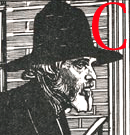 arlyle's Calvinistic upbringing, though he eventually rebelled against it, may account for the pessimism (and the occasional despondency) which characterized both his personal life and much of his literary output. Parts of Sartor Resartus recall to mind the terrifying sermons — one thinks, for example, of Jonathan Edwards's famous "Sinners in the Hands of an Angry God" — which had been produced by the great Calvinist preachers of a much earlier generation. Carlyle was very well-read, with an affinity for languages (by the end of his life he knew French, Latin, Greek, German, Italian, Spanish, and Danish) and his dense and difficult prose is extremely allusive. He makes consistent use of the Bible, and frequently (if often ironically or sceptically) invokes the works of various continental philosophers like Rousseau and Voltaire, but more often his references are to the works of the great philosophers and poets of the German Renaissance: Kant, Hegel, Novalis, Goethe, Fichte, Schelling, Schlegel, Richter. His poetic sensibilities were too cramped for him to feel much kinship with, or be much influenced by, the great English Romantics.
arlyle's Calvinistic upbringing, though he eventually rebelled against it, may account for the pessimism (and the occasional despondency) which characterized both his personal life and much of his literary output. Parts of Sartor Resartus recall to mind the terrifying sermons — one thinks, for example, of Jonathan Edwards's famous "Sinners in the Hands of an Angry God" — which had been produced by the great Calvinist preachers of a much earlier generation. Carlyle was very well-read, with an affinity for languages (by the end of his life he knew French, Latin, Greek, German, Italian, Spanish, and Danish) and his dense and difficult prose is extremely allusive. He makes consistent use of the Bible, and frequently (if often ironically or sceptically) invokes the works of various continental philosophers like Rousseau and Voltaire, but more often his references are to the works of the great philosophers and poets of the German Renaissance: Kant, Hegel, Novalis, Goethe, Fichte, Schelling, Schlegel, Richter. His poetic sensibilities were too cramped for him to feel much kinship with, or be much influenced by, the great English Romantics.
He was in a sense a refugee from the Enlightenment, and he did draw on the great English authors and poets of the eighteenth century. Whose work, for example, did he have in mind when he suggested, in "Chartism," that "The time has come when the Irish population must either be improved a little, or else exterminated"? To what great eighteenth-century poet does he make a number of more or less overt references in "Signs of the Times," and with what work by that poet does he intend that his own essay should be likened? In what ways, in the same essay, is his depiction of the dialectical relationship between the two opposing forces of mechanism and dynamism like or unlike Blake's portrayal of the opposing states of Innocence and Experience?
Carlyle found a great deal of his inspiration, however, in the lives of various historical figures, whom he tailored to fit his point of view. All his life he tended to see what he wanted to see, in men, in religion, in philosophy, and in history. What do his heroes — men like Dante, Shakespeare, Luther, Knox, Johnson, Burns, Cromwell, Napoleon, and Frederick the Great — have in common?
Carlyle exerted an enormous influence on his age. First, he provided an influential example of a serious person who had lost his conventional religious belief and yet found a way to salvage fragments of that belief. Second, he did much to awaken the social consciences of his contemporaries and prevent them from ignoring the costs of modern industrial and urban change. Third, he demonstrated by his own example the seriousness and relevance of literature to contemporary existence. Fourth, in an age which glorified the work ethic he brought to many a new sense of the meaning of existence and a belief not only in the necessity but in the essential dignity of their work. In works like Sartor Resartus his influence upon the thought of his time was incalculable. Ruskin, Arnold, George Eliot, Dickens, Lawrence, and so many others acquired not merely literary stances and techniques but also practical modes of intellectual and spiritual survival from this earliest of the great Victorian sages.
Text last modified 1988; links last added 12 March 2005